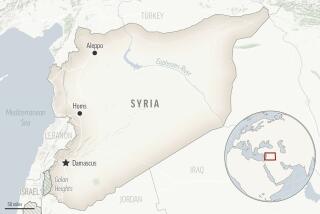Syria bombing kills dozens as diplomats struggle to set up talks
- Share via
BEIRUT — As diplomats haggled over the prospect of Syrian peace talks, dozens of people were killed and many injured Sunday when a massive car bomb exploded outside the central Syrian city of Hama.
The blast was the latest in a string of bombings and fierce clashes that have continued to ravage Syria as U.S., Russian and other officials try to bring both sides to the table in Geneva for negotiations to help end the conflict, now in its third year. But the prospects for peace appear dim.
A suicide driver detonated the car bomb on an eastern approach to Hama, according to opposition and official accounts. The explosion engulfed nearby vehicles, including a truck filled with gas canisters that also burst into flames, causing additional casualties and damage, according to the official Syrian news agency.
At least 37 people were killed and dozens injured, according to the news agency. The car bomb carried about 11/2 tons of explosives, it reported.
Suicide car bombs have become a favorite weapon of rebels seeking to oust the government of President Bashar Assad. A day earlier, a car bomb exploded at a checkpoint outside the government-controlled Damascus suburb of Jaramana, leaving many dead and injured. Fierce clashes followed the attack.
The attack in Hama was the work of the Al Qaeda-linked Al Nusra Front rebel faction, according to the British-based Syrian Observatory for Human Rights, a pro-opposition monitoring group. Militant Islamist groups, some tied to Al Qaeda, have become powerful components of the rebel movement. Al Qaeda factions have clashed with other rebel groups and with Kurdish militiamen seeking autonomy in northeastern Syria.
The monitoring group put the number of dead in Sunday’s attack at 43, higher than the government’s figure. Thirty-two were civilians; the rest were members of the security forces, it said. The bomb was detonated at a government checkpoint, the group said. Military checkpoints are frequent targets for rebel attacks.
Hama, a provincial capital about 120 miles north of Damascus, had been the site of fierce fighting in the first year of the civil war but is now largely under government control. However, opposition forces are active outside the city, which has considerable symbolic importance in the conflict.
Hama gained notoriety as the site of a brutal 1980s government crackdown on the Islamist Muslim Brotherhood during the presidency of Assad’s late father, Hafez. In interviews, Bashar Assad has likened the Muslim Brotherhood-led uprising of a generation ago to the threat posed today by “terrorists,” his label for opponents seeking to overthrow his family’s more-than-four-decade rule.
With no end in sight for the Syrian conflict, international diplomats have in recent weeks renewed a push for the long-delayed “Geneva II” conference. The talks would be aimed at forming a transitional government and finding a negotiated settlement to end the war.
On Sunday, the head of the Arab League, Nabil Elaraby, told reporters in Cairo that the Geneva II talks would be held Nov. 23 in the Swiss city. He acknowledged “many difficulties,” the Associated Press reported, but said “it’s time that the killing and the bloodshed stopped.”
But Lakhdar Brahimi, the U.N.-Arab League special peace envoy for Syria, who appeared with Elaraby, denied that any date had been finalized. Brahimi is on a swing through the region and plans to meet with, among others, representatives of Turkey and Qatar, two major backers of Syrian rebel forces.
Confusion has been rampant about whether and when the talks will take place.
Last week, Syrian Deputy Prime Minister Qadri Jamil told reporters in Moscow that Geneva II would be held Nov. 23 and 24. But the U.S., Russia and the United Nations responded that no firm date had been set.
Apart from the date, it is unclear how the planned talks will proceed and who will represent the opposition.
The Syrian government has said it will attend the talks without preconditions. But Assad also has said his side will not negotiate with terrorists. That would seem to rule out any of the armed rebel groups who hold sway over vast parts of Syria.
The major, U.S.-backed opposition group, the Syrian National Coalition, has yet to commit to attending the talks, and its influence with fighters in Syria is limited, anyway. Representatives of some rebel brigades and other opposition figures have said they would refuse to attend any peace talks if Assad’s departure from power is not guaranteed.
Assad has said he has no intention of stepping down and has even hinted that he may run for a new term in national elections scheduled for next year.
More to Read
Sign up for Essential California
The most important California stories and recommendations in your inbox every morning.
You may occasionally receive promotional content from the Los Angeles Times.













